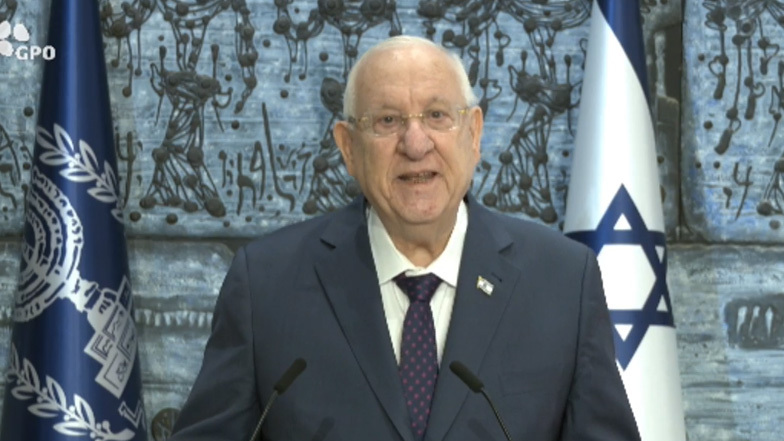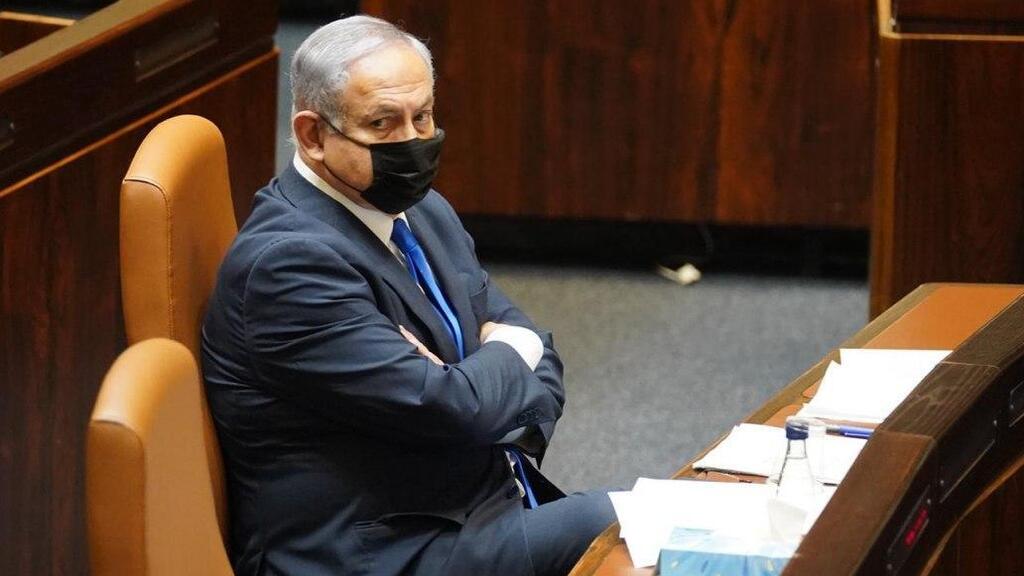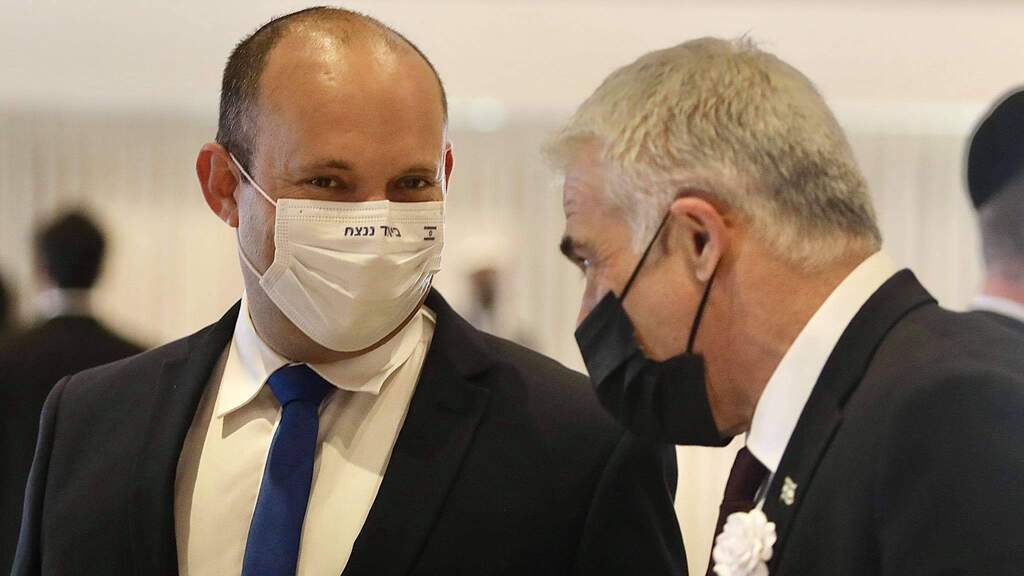With Israeli politics at an impasse, a new option has been put on the table – Prime Minister Binyamin Netanyahu as president.
As testimony against the premier was heard in a Jerusalem courtroom, President Reuven Rivlin on Monday received representatives of the parties elected to the Knesset to hear their recommendations for which lawmaker they thought should be tasked with forming Israel’s next government.
On Tuesday, Rivlin gave the mandate to Netanyahu, calling the decision “ethically difficult.”
4 View gallery


President Reuven Rivlin announcing he will task Benjamin Netayahu with forming a new government
(Photo: GPO)
Yet, despite receiving the mandate, Israel’s long-time prime minister is still far from forming a government. While Naftali Bennett, head of the Yamina party and a supposed kingmaker, has hinted that he will enter a government led by Netanyahu , the Likud party leader still lacks the 61 lawmakers needed to form a functioning ruling coalition.
To move forward, Netanyahu would have to convince the hawkish Religious Zionist party to accept the Islamist Ra’am party as a government supporter, something the right-wing party’s heads and ideological leaders have staunchly opposed. And so, for Israel’s political system, the path forward remains unclear.
Prof. Moshe Hellinger, an expert on Israeli politics in Bar-Ilan University’s political studies department, says that “at present, Netanyahu has no way to form a government.”
Addressing the chances that Ra’am and Religious Zionism will form a government together, he says: “Islamists that deny the existence of Israel as a Jewish state, and have connections with Hamas in Gaza, sitting with nationalists like [Religious Zionist party chief Bezalel] Smotrich and [extremist MK Itamar] Ben Gvir – how will that work?”
Netanyahu, who is currently standing trial for corruption, is at the heart of the political impasse that has plagued Israel for the past two years, causing the country to hold four rounds of elections, all of which have failed to produce a decisive result and a stable government. But there may be a change coming.
According to recent reports, politicians close to the prime minister, and Netanyahu himself, are considering the presidency for the premier as a possible solution for Israel’s political dilemma. This means that, for the first time, Netanyahu’s closest supporters are sensing a possible end to his rule.
A high-ranking source within the Likud claims that Netanyahu’s nomination to be president enjoys a majority in the Knesset, the Jerusalem Post published a poll by the research institute Panel Politics on Monday, which broached the question of Netanyahu's possible election to be the president, and who will possibly lead the Likud after him.
The poll found that 53% of Israelis are opposed to Netanyahu assuming the position of president. In light of this response, Panel Politics’ CEO Menachem Lazar says that “people that don’t want him, don’t want him period.”
4 View gallery


Prime Minister Benjamin Netanyahu sitting alone during a Knesset session last October
(Photo: The Knesset)
Lazar says that his impression is that those opposed to the prime minister are even less inclined to accept him as president, a title that makes its bearer a state symbol.
President Reuven Rivlin’s seven-year term expires in July. A replacement must be approved by the Knesset one month before the end of his term.
Dror Yehudia, a store manager in Jerusalem’s city center, voted for Netanyahu opponent Benny Gantz in Israel’s March 23 elections. and believes Netanyahu as president is a terrible idea.
“It would be bribery" he says - a payment to Netanyahu so that he would relinquish his hold on the premiership.
“He should face trial. If he’s innocent, let him be reelected, and if he isn’t – he should go to prison,” the store owner says.
Yehudia is worried that such a solution would send a message that corruption pays.
“He will stay corrupt, and it will also send a message to other people that there’s a loophole that allows corruption, they will know that there’s an option to get away with anything," he says.
“I think that politicians have to be clean of conscience.”
Some 59% of Likud voters who cast their ballots to make Netanyahu the most powerful man in the country, said that they would support the change of position, which would put the current prime minister in a largely symbolic role.
However, Avner Mashraki, who heads the Likud party’s branch in the West Bank settlement of Ariel, has a possible explanation.
“In my opinion, if he becomes president and the prime minister will be from the Likud, and it is highly likely that this is the form that it would take, I think that they will cooperate and then he will be able to help the next prime minister run the country,” Mashraki says.
“I want him to continue as prime minister for many years to come,” Mashraki says. But if Netanyahu decides that he would like to be president, “I would respect his decision.”
If Mashraki has to decide between Netanyahu leaving Israeli politics, and Netanyahu becoming president, he would choose the latter.
If Netanyahu as president takes an active part in the decision making of the next government, he would be stepping beyond the limitations of that role. This doesn’t concern the Likud activist, however.
“Nowadays, the state attorney, the judges, the courts in Israel aren’t acting according to the law,” he says, referring to allegations voiced by Netanyahu and his supporters that the premier is being unlawfully persecuted.
He would be concerned about Netanyahu stepping out of bounds as president “when they act according to the laws of the State of Israel.”
Asked about the possible change in the political atmosphere, Panel Politics head Lazar says that he doesn’t believe that the fact that an Israeli media outlet ordered a poll indicates a change, nor does he thing there is a sense within the public that the Netanyahu era is over.
Rather, he says, it is the result of the theoretical conversation surrounding a presidency option.
Hellinger, however, thinks that a change in the political situation, and an accompanying change in the public perception of Netanyahu’s chances, can be identified – starting with last month’s elections.
A change within the prime minister’s party, most obviously exemplified by the formation of the New Hope party by former Likud lawmakers, and supported by Likud voters, revealed cracks in the movement’s support for the premier.
Now, with Netanyahu likely having to rely on the Islamist movement to form a government, and with his trial taking place in the background, the situation has allowed the Likud leadership “to show a little bit more courage,” Hellinger says.
4 View gallery


Yamina leader Naftali Bennett with Opposition Leader Yair Lapid, head of the Yesh Atid party
(Photo: Marc Israel Sellem)
Apart from Gideon Saar, New Hope’s head, the party’s leadership was afraid to move against Netanyahu. But with the change in the situation, “it is possible that they’ll grow a backbone for the first time” and tell Netanyahu to move aside, he says.
Talk of the prime minister as president reflects the activists’ movement in this direction, and this change in circumstances, of course, is also felt by the public, that senses a possible change, Hellinger says.
Bennett’s Tuesday announcement has supposedly opened the door for his cooperation with Netanyahu, though Bennett’s party put forward his own name as their choice for prime minister.
But Hellinger suggests that the Yamina head is “counting on Netanyahu getting his chance [at forming a government] failing, and then Bennett will have more justification to form a government with the center-left and Saar,” instead of another round of elections.
Netanyahu’s future as president is doubtful, the professor believes, since he lacks a Knesset majority that would support his nomination, despite Likud’s claims to the contrary.
Netanyahu’s chance of returning to the prime minister’s chair, in turn, hinges on hawkish Smotrich’s acceptance of Ra’am, which would require him to “throw in the trash” years of adherence to his far-right ideology.
Reprinted with permission from The Media Line


